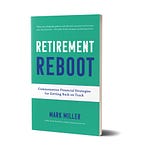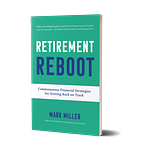
You’ve probably heard plenty of advice over the years about the benefits of working longer and delaying retirement. I write about this often, and I do believe it can be one of the best strategies for improving your retirement outlook. Working longer can help pay for living expenses while you wait to claim Social Security, boosting your annual benefits. It also can mean a few more years of retirement saving - and fewer years relying on savings.
But working longer isn’t always an easy thing to pull off. Research shows that about half the time, job loss, health problems or just plain burnout push people out of the workforce sooner than they expected.
On today’s podcast, we explore that last point - burnout. . . and how to go about adjusting your mindset about work toward the end of your career. The key elements of success include expanding your horizons, being flexible and open to changing your mindset about what kind of work is possible and satisfying.
One of my guests today has a great deal of interesting guidance to offer on this topic, because he’s a career coach, and he also operates Career Pivot, an online network for people navigating careers in the second half of life. Marc also has a terrific book, Repurpose Your Life, and he also hosts a podcast that carries the same name as his book. That’s the good news. Here’s the bad: his name is Marc Miller. I kid you not - on this podcast, Mark Miller interviews Marc Miller. So it goes - just try to follow the bouncing ball.
Also joining me is Russ Eanes. Russ worked for several decades in the book publishing business, and also has worked as a minister in the Mennonite Church. Around the time that he turned 60, Russ decided to bail out of his job after tiring of the tumultuous changes hitting the publishing world. He felt that his effectiveness on the job was falling, and he was getting very unhappy with all the downsizing of colleagues that he was being asked to do by his employer.
Then, a couple major life events shocked Russ into taking action that included a year-long sabbatical and a 500-mile trek on the Camino De Santiago in Spain, which is the subject of his recent book. Russ recently transitioned his career to full-time freelance work as a writer, editor and consultant in publishing. He also is a member of Marc Miller’s Career Pivot network.
Speaking of his book - if you live in Virginia, check out upcoming speaking appearances Russ will be doing on February 11th and 12th in and around Harrisonburg and Crozet.
Listen to the podcast by clicking the player icon at the top of this newsletter. You also can find the podcast on Apple Podcasts, Spotify and Stitcher.
Where do the presidential candidates stand on Social Security?

Heading into the debate in New Hampshire tonight, Social Security has not been a topic in any of the presidential forums. But no topic is more important to the well-being of today’s older voters - and younger workers who will rely on the program down the road.
This weekend in The New York Times, I examine where the major candidates stand on Social Security reform. All of the Democrats’ proposals include a fix for the program’s looming financial shortfall. The combined trust funds for Social Security’s retirement and disability programs are on course to be depleted in 2035; without changes, funding from payroll tax receipts will be sufficient to pay only 80 percent of currently scheduled benefits.
But all of the Democratic candidates go further than that, proposing expanded benefits - either across the board or targeted for vulnerable seniors.
Meanwhile, President Trump broke with Republican party orthodoxy on Social Security as a candidate in 2016, promising to oppose benefit cuts. And he reiterated that pledge in this week’s State of the Union address. But Democrats argue that one recent statement by the president signaled his openness to considering reduction.
And he provoked attacks from Democrats just last month following a CNBC interview at the recent World Economic Forum in Davos, Switzerland. Asked if entitlements will “ever be on your plate”, Mr. Trump replied that “at some point they will be.” Democratic candidates and Social Security advocates pointed to the exchange as evidence Mr. Trump would seek cuts to Social Security - and Medicare - in a second term.
To learn more, check out my “Retiring” column in The New York Times this weekend.
Subscribe now!
This is a listener-supported project, so please consider subscribing.
The podcast is part of the subscription RetirementRevised newsletter. Subscribers have access to all the podcasts, plus my series of retirement guides on key challenges in retirement. Each guide is paired with a podcast interview with an expert on the topic; the series already covers Social Security claiming and the transition to Medicare, and how to hire a financial planner. The most recent looks at the critical decision between Original Medicare and Medicare Advantage.
Readers also get my weekly summary and analysis of key developments in retirement. This week, you’ll learn about several new reports on trends in longevity, how the new SECURE Act is impacting estate plans, and whether the coverage gap in Medicare Part D (the donut hole) has really closed.
You can subscribe by clicking the little green “subscribe now” link at the bottom of this page, or by visiting RetirementRevised.com. And if you’re listening on Apple Podcasts, Spotify or Stitcher, I hope you’ll leave a review and comment to let me know what you think.












